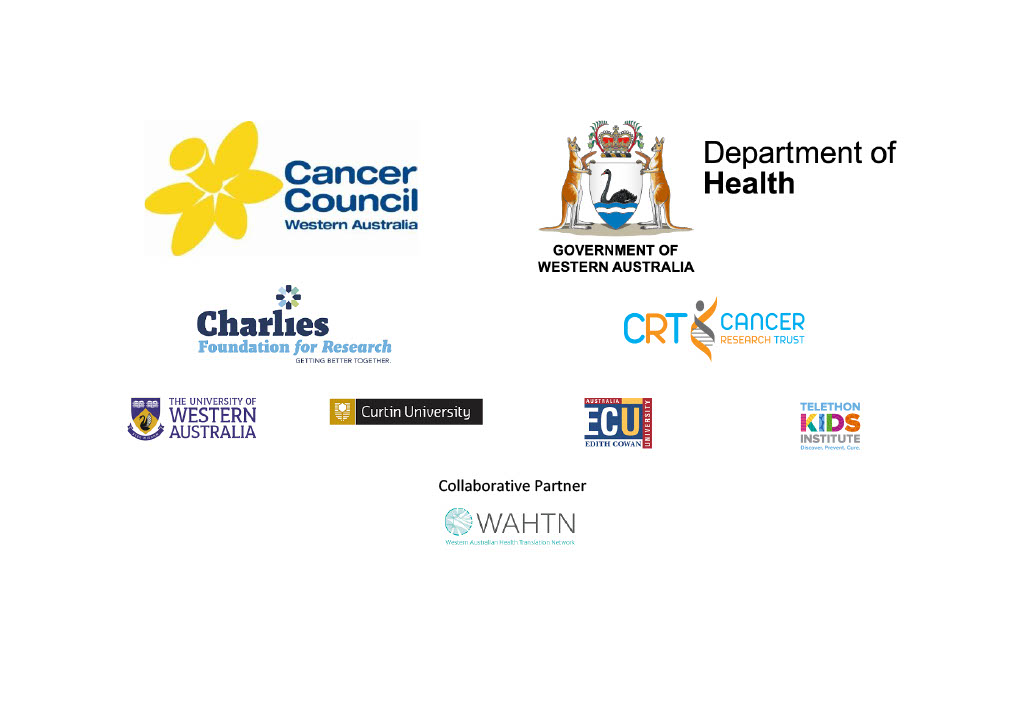Building capacity and innovation in WA's cancer research community.

The Collaborative Cancer Grant Scheme (CCGS) was developed by Cancer Council WA in 2016 as a new funding initiative and has, in partnership with leading Western Australian institutions, awarded $1,121,471 to successful recipients over four funding rounds. The key objective of the CCGS is forging partnerships with the WA government and research and funding institutions to establish a pool of funds to support early- to mid-career cancer researchers in WA, with an emphasis on building capacity within the next generation of cancer research leaders in WA.
The Collaborative Cancer Grant Scheme (CCGS) was developed by Cancer Council WA in 2016 as a new funding initiative and has, in partnership with leading Western Australian institutions, awarded $1,121,471 to successful recipients over four funding rounds. The key objective of the CCGS is forging partnerships with the WA government and research and funding institutions to establish a pool of funds to support early- to mid-career cancer researchers in WA, with an emphasis on building capacity within the next generation of cancer research leaders in WA.
The unique feature of the CCGS is that it promotes collaboration between Universities, the WA government, research funding bodies, research institutions in WA, and between researchers themselves. This has had, and continues to have, a multitude of positive benefits, including expanding the cancer research landscape in WA. That said, the sustainability of the CCGS is dependent on the continuing support of the funding partners.
The 2020/2021 funding year saw support from Cancer Council WA, the Department of Health (DoHWA), Charlies Foundation for Research, the Cancer Research Trust, The University of Western Australia, Curtin University, Edith Cowan University, and Telethon Kids Institute, totalling $327,268, with each team receiving up to $65,000 for a 12-month project. This level of financial support enables the awarding of five grants, more than tripling the number of research teams that would otherwise be supported.
The development of new connections and research initiatives in the relatively small cancer research community in WA is of critical importance to this community. Researchers attribute the development of new approaches, methodologies, and refined research processes to these new collaborations. As one recipient commented,
The major benefit of this collaboration has been the cross-fertilization of ideas and bringing together of different expertise to create a well-designed study.
Similarly, another recipient attributed the development and application of a different method of analysis for existing data to their collaboration. This knowledge was then transferred outwards to impact other groups – in this case, students were able to learn a novel coding language, and were "…importantly, exposed to a different way of thinking and approach to data analysis."
Collaboration with other members of the broader cancer research community in WA, interstate and overseas, has led to the development of new research areas and further funding opportunities. One recipient acknowledged the development of a new research area and subsequently secured a successful NSW Dust Diseases Board project grant. A recent evaluation concluded that successful collaborations resulted in an increased number of applications for funding and/or grants, as well as published conference papers and presentations.
Finally, there is evidence from successful recipients to suggest that the CCGS does result in new research outcomes from the exchange of ideas, methods and techniques between collaborating researchers in the scheme. As aptly summarised in this statement from one of the CCGS recipients,
Completion of this study required collaboration between researchers and clinicians…By combining the skills, data and samples that we each had access to, we were able to explore a new application for an innovative workflow, discover changes in blood (platelet) RNA that may be new markers of treatment response in melanoma, and exchange new ideas and concepts to enrich each of our research fields and support development of new ideas and applications that will hopefully improve the outcome for patients.
The Collaborative Cancer Grant Scheme is positioned uniquely for the WA cancer research community to expand in new and exciting ways. This scheme cannot exist without collaboration between the WA government, WA's leading higher education institutions, medical institutes, and leading not-for-profits in the health sector. We seek to establish a funding structure for the sustainability of this scheme into the future, such that WA cancer researchers can continue to pool their resources to produce innovative research outcomes.






